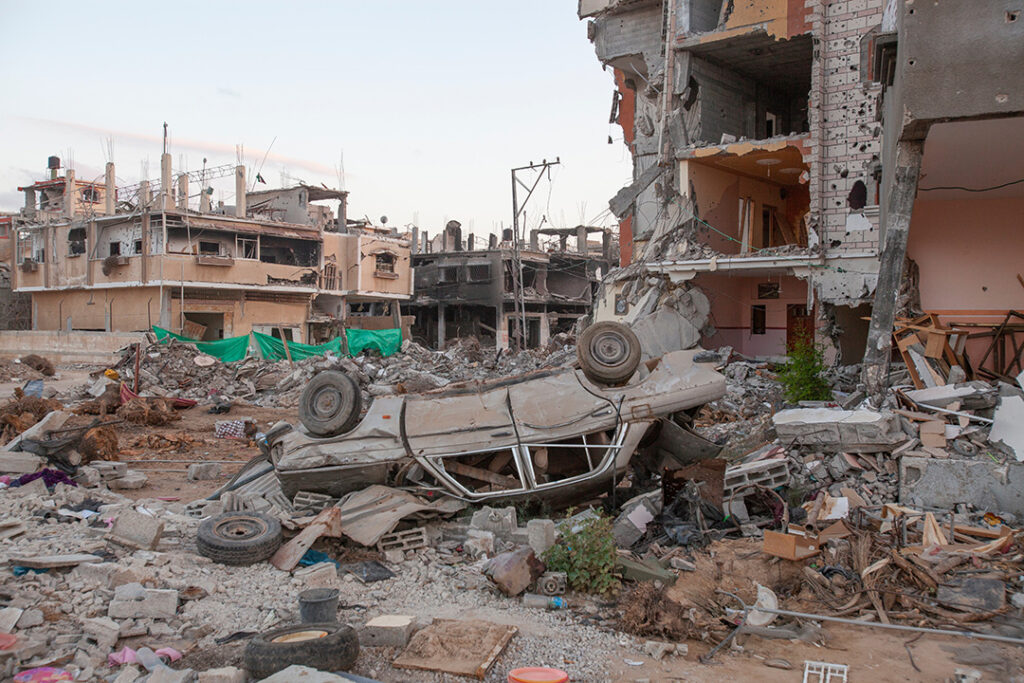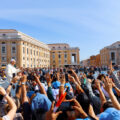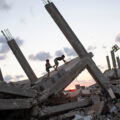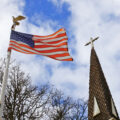The Vatican and Israel: A critical look at the Church’s response to the Hamas attack and the Israel-Hamas War
The Vatican and Israel: A critical look at the Church’s response to the Hamas attack and the Israel-Hamas War
The Vatican’s balanced response to the 7th of October Hamas attack raises some questions, as analysed by our analyst Ghila Amati.
This weekly comment was written by Ghila Amati and reflects her personal analyses and opinions, rather than those of EARS.
Global reaction to the Middle East crisis
It is October 7th, 2023, and Hamas attacks Israel. The world is in shock. However, expressions of support from the pope, among others, have not been forthcoming. Why is this the case, and how does this compare to previous attacks in other parts of the world?
In the complex world of global politics, especially in the Middle East, acts of violence and conflict often prompt immediate reactions from world leaders and influential bodies. The recent Hamas attack and subsequent massacre in Israel, leading to Israel’s initiation of a war with Gaza, was a significant and harrowing event with wide-reaching consequences, warranting such responses. However, in the midst of various condemnations, expressions of support, and calls for peace, the Vatican’s response notably stood out.
Pope Francis’ public address to the Hamas attack
On October 8th, Pope Francis made an appeal during his Sunday Angelus: “I am following apprehensively and sorrowfully what is happening in Israel, where the violence has exploded even more ferociously, causing hundreds of deaths and casualties. I express my closeness to the families and victims. I am praying for them and for all who are living hours of terror and anguish. May the attacks and weaponry cease. Please!” he pleaded. He also made it clear in his remarks that, “terrorism and war do not lead to any resolutions, but only to the death and suffering of so many innocent people. War is a defeat! Every war is a defeat! Let us pray that there be peace in Israel and in Palestine.”[1] This was even before Israel responded in any way to the attack, which it did three weeks later by bombarding Gaza.
Views from the Church and Israel
The Latin patriarch of Jerusalem, the newly created Cardinal Pierbattista Pizzaballa, also issued a statement and expressed concern over the casualties on both sides, warning that they would further seed hatred and destabilise the region.[2]
Foreign Minister Eli Cohen criticised the Vatican for its response to the attacks on Jews and Israelis, demanding a stronger condemnation. He expressed dissatisfaction with the Vatican’s statement, which he felt focused more on Gazan civilians, while Israel mourned significant casualties. He stated that Israel “expects the Vatican to come out with a clear and unequivocal condemnation of the murderous terrorist actions of Hamas terrorists who harmed women, children and the elderly for the sole fact that they are Jews and Israelis,” and added that “it is unacceptable that you put out a statement expressing worry primarily for Gazan civilians while Israel is burying 1,300 who were murdered.”
The lack of a definitive stance
The lack of a definitive stance from the Vatican contrasted sharply with the explicit condemnations from several Western nations, notably from U.S. President Joe Biden. He labeled the attack on Israel as “pure, unadulterated evil,” and repeatedly described it as “sheer evil” and “indiscriminate evil.” Strong reactions from other leaders included words like “atrocities,” “sickening,” “abhorrent,” “brutality,” and “violation of every code of human morality.”[3] [4]
Religious leaders and institutions also responded strongly. For example, the Church of England’s bishops issued a much stronger condemnation of Hamas’ acts of terrorism on October 7th than the pope, criticising its merciless killing of civilians, desecration of bodies, brutal treatment of the vulnerable, hostage-taking, and continued rocket attacks on Israeli targets. They highlighted that these actions, violating international law, stem from Hamas’ denial of Israel’s right to exist and its use of civilians as human shields.[5] Similarly, Mgr Éric de Moulins-Beaufort, Archbishop of Reims and President of the Conference of Bishops of France, unreservedly condemned the attacks and the resulting spiral of violence, calling for the release of hostages and offering support and prayers to the affected families.[6]
Pope Francis’ balanced diplomacy
In November, Pope Francis met at the Vatican with 12 relatives of hostages held by Hamas in Gaza, and separately with 10 Palestinians who had lost family members or were affected by the war.[7] This again suggested an attempt to draw a parallel between the two situations, without issuing a clear enough condemnation of the inhumane kidnappings, beheadings, rape, torture, and the intentional killing of babies by Hamas.[8]
Historical precedents of the Vatican’s diplomacy
Historically, the Catholic Church has been an advocate for peace and moral clarity.[9] The Vatican’s diplomatic role during crises emphasises peace and human rights. Nevertheless, the absence of a definitive stance from the pope’s office stunned many and perhaps suggested selective responsiveness. An illuminating comparison arises when examining Pope Francis’ reaction to the 2015 Paris attack. Then, the pope unequivocally condemned the act of terror, stating, “Using God’s name to justify this path is blasphemy,” and, “Such barbarity leaves us dismayed and we ask how the heart of man can conceive and realise such horrible events.”[10] Such a robust and explicit criticism contrasts starkly with the pope’s more cautious remarks concerning the Hamas attack on Israel, which further strengthens the argument that the Vatican’s recent response was surprisingly measured.
Evaluating the Judeo-Christian alliance
The recent events shine a spotlight on the broader question of a Judeo-Christian alliance. Is this alliance naive, or is it genuinely feasible? Historically, this bond has witnessed both harmony and strain. The atrocities of the Holocaust in the 20th century severely affected Judaism. However, the subsequent period witnessed significant shifts in Judeo-Christian dynamics. The Second Vatican Council in the 1960s aimed to fortify this relationship. The Catholic Church’s Nostra Aetate in 1965, a pioneering document, denounced antisemitism and acknowledged the common lineage of Jews and Christians.[11]
This marked the beginning of a new era of collaboration and mutual respect. Interfaith committees began meeting regularly in the 1970s to address relations between the religions, and both institutions have since worked together on diverse issues, from social justice and interfaith dialogue to Holocaust education.[12]
In the current context, the Vatican’s ambiguous response raises the question: can there be a real partnership between Judaism and Christianity if one party remains silent or non-committal during crucial times? True partnerships are built on trust, mutual understanding, and unequivocal support, especially during trying times.
Challenging the pope’s moral authority
Finally, the pope’s response challenges the moral authority of his title. If heads of state can provide unambiguous moral clarity, the question arises: is the pope’s role as a moral compass becoming redundant? The pope, as the leader of over a billion Catholics, has always been seen as a beacon of moral guidance.[13] [14] But when global leaders are more assertive in their moral standpoints, it places the pope’s position in a new, challenging light.
This weekly comment was written by Ghila Amati and reflects her personal analyses and opinions, rather than those of EARS.
Interested in similar topics? Go to our Dashboard and receive free updates.
Sources
[1] CCA on Holy Land Violence | Catholic Charities Atlanta.
[2] Latin patriarch of Jerusalem says he would swap himself for Israeli hostages in Gaza | The Times of Israel
[3] FM Cohen slams Vatican over tepid response to slaughter of Jews and Israelis | The Times of Israel
[4] Biden Condemns Hamas Attack on Israel as ‘Evil’ – The New York Times
[5] Statement from the House of Bishops on the war in Gaza
[6] Église catholique de France : « Nous condamnons sans réserve » les attaques du Hamas – ZENIT
[7] Pope meets relatives of Israeli hostages and Palestinians in Gaza and sets off firestorm over words
[8] ‘Screams Without Words’: How Hamas Weaponized Sexual Violence on Oct. 7.
[9] The Church’s View on War and Peace
[10] Pope Francis condemns Paris terrorist attacks: ‘Using God’s name to justify this path is blasphemy’ – The Washington Post
[12] Jewish-Christian Relations, Encyclopedia Judaica
[13] The Moral Perspectives and Policy Priorities of Pope Francis | Council on Foreign Relations
[14] Pope Francis as Moral Leader – Thomas J. Massaro : PaulistPress






